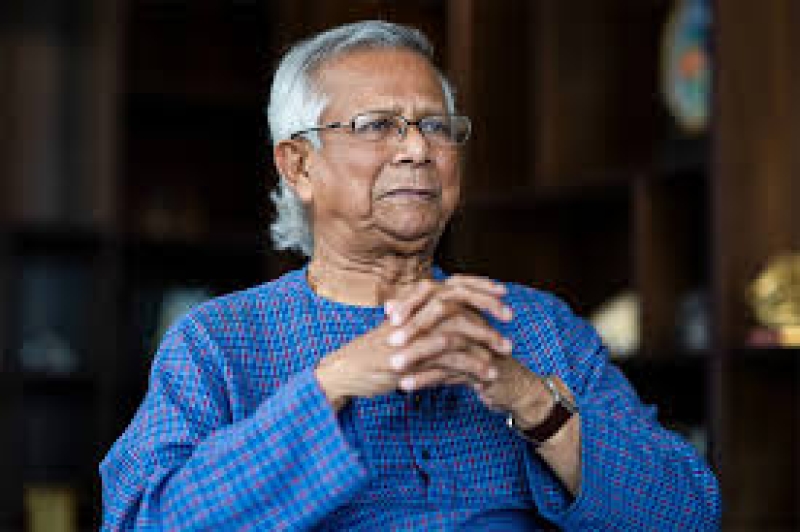- India Sees 9% Drop in Foreign Tourists as Bangladesh Visits Plunge |
- Dhaka Urges Restraint in Pakistan-Afghan War |
- Guterres Urges Action on Safe Migration Pact |
- OpenAI Raises $110B in Amazon-Led Funding |
- Puppet show enchants Children as Boi Mela comes alive on day 2 |
Yunus Leads Bold 360° Diplomacy Amid Key Transition

Chief Adviser Professor Dr Muhammad Yunus has launched an ambitious and multidirectional foreign policy strategy, marking a clear departure from the India-centric orientation of the ousted regime. Dubbed by analysts as “360-degree diplomacy,” this approach reflects Bangladesh’s effort to reposition itself on the global stage during a critical political transition.
Anticipating diplomatic hurdles after the fall of Sheikh Hasina’s long-standing government, many observers expected challenges. However, Nobel Peace Laureate Prof Yunus has so far exceeded expectations—using his global stature and seasoned diplomacy to reset the country’s foreign policy with balance and foresight.
Since assuming office in August 2024, he has spearheaded a dynamic outreach effort, engaging with leaders across continents through both bilateral meetings and multilateral forums.
His four-day Japan visit starting tomorrow, where he’ll attend the 30th Nikkei Forum and meet Prime Minister Shigeru Ishiba, follows closely on the heels of a high-stakes visit to China—highlighting a deliberate sequence aimed at diplomatic balance in a polarised world.
From Washington to Beijing, and from Delhi to Davos, Prof Yunus’s outreach spans all geopolitical directions, embracing traditional allies and forging new partnerships. Analysts say this recalibrated diplomacy aims to strengthen economic recovery, ensure national stability, and restore global confidence in Bangladesh.
First Breakthrough: UAE Pardons Bangladeshi Protesters
A landmark early success came when over 100 Bangladeshi expatriates jailed in the UAE for participating in pro-democracy protests were pardoned. Their release followed direct talks between Prof Yunus and UAE President Sheikh Mohamed bin Zayed Al Nahyan.
Foreign Affairs Adviser Md Touhid Hossain described it as “unprecedented,” crediting Yunus’s global credibility and clear communication that the protests were domestic in nature.
Engagement with the West
Yunus made his diplomatic debut at the 79th UN General Assembly in New York in September 2024. There, he held a key meeting with US President Joe Biden, discussing democracy, trade, and future collaboration.
He also reunited with his long-time friend, former US President Bill Clinton, at a Clinton Global Initiative event. On a single day, he met 16 top global figures, including the PMs of Pakistan, Canada, and Italy, presidents of Brazil and Mauritius, IMF’s Managing Director, and the World Bank President.
In his UNGA speech, Prof Yunus urged the world to support a "new Bangladesh" rooted in democracy and freedom.
Global Support Grows
British backing came early, with a high-level UK delegation visiting Dhaka to affirm London’s continued support and explore post-Brexit opportunities.
Malaysian PM Anwar Ibrahim led a 58-member delegation in October, making him the first foreign head of government to visit post-transition. Citing a 40-year friendship, Anwar endorsed Yunus’s leadership.
Two months later, Timor-Leste’s President Ramos-Horta visited for Victory Day, reinforcing strategic outreach in Southeast Asia. As ASEAN’s incoming member, Timor-Leste could play a future role in regional diplomacy, particularly concerning the Rohingya crisis.
Climate Diplomacy at COP29
At COP29 in Baku, Yunus took the global stage, proposing a "three-zero" civilisation: zero carbon emissions, zero wealth concentration, and zero unemployment.
His compelling speech and over 20 meetings—including with Turkey’s Erdogan and leaders from Nepal, Bhutan, Belgium, and the Maldives—positioned Bangladesh as a forward-thinking climate leader. He also met with UN chief Guterres, former UK PM Theresa May, and heads of FIFA, IOM, and Amnesty International.
In a youth dialogue, Yunus encouraged bold dreaming, stating, “If you dream, your life will change. If you don’t, it won’t.”
In a first-of-its-kind diplomatic show, all 27 EU ambassadors—seven based in Dhaka and 20 flown in from New Delhi—jointly met Prof Yunus in November, signalling a unified commitment to enhanced EU-Bangladesh ties. Officials hailed it as a landmark in the evolving Bangladesh-EU relationship.
Yunus’s presence at the 2025 World Economic Forum in Davos confirmed his stature on the world stage. He joined 47 events, held talks with German Chancellor Olaf Scholz, UN Secretary-General Guterres, EU Commission President Ursula von der Leyen, and business leaders from Meta, Maersk, and DP World.
He used the platform to advocate for justice, digital equity, and sustainable growth, and attracted global media attention, with interviews on Reuters, CNBC, and the Financial Times.
In March 2025, UN Secretary-General António Guterres visited Bangladesh, spending four days assessing reforms and the Rohingya situation. He and Prof Yunus travelled to Cox’s Bazar and shared an iftar with nearly 100,000 Rohingyas and locals—a symbolic gesture of solidarity.
Guterres praised Yunus’s leadership and pledged the UN’s full support for Bangladesh’s democratic and humanitarian transition.

